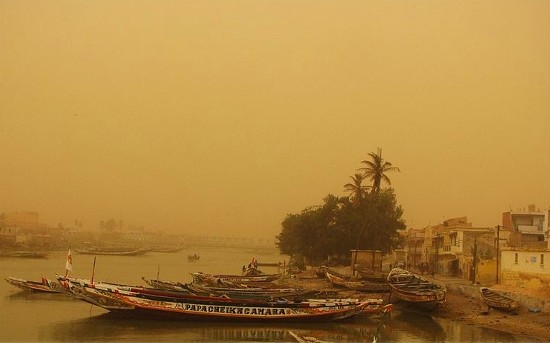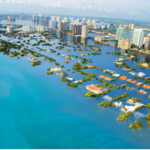Climate change is changing the insurance industry. In the United States alone, 40% of the population resides in coastal areas defined as being at climate change risk. The insurance industry can approach those seeking coverage for homes and property by simply denying coverage or upping premiums and deductibles to a point where consumers are priced out. But the industry has another approach which it calls parametric insurance. These are event-based or index-based policies that are applied to extreme weather or climate change events such as rainfall, hail storms, floods, sea level rise, hurricanes and tornados exceeding agreed parameters.
This is a relatively new idea for places like Europe and the United States. But for Global South countries, parametric insurance policies resonate. A policy can provide a farmer with crop coverage at a pre-determined price per hectare in case of loss or damage arising from extreme weather events.
The industry today is producing parametric policies not just for individuals but for governments where coverage includes damage payments caused to coastal areas and offshore reefs from hurricanes based on storm category thresholds exceeding agreed levels. The payments from these policies are immediate and can be used for restoration and recovery efforts.
Parametric insurance has been around for about two decades. In Africa, the offering, however, is recent. The World Economic Forum notes that parametric policies work well there because rather than indemnifying actual losses provide predetermined payouts. the advantages include claims getting settled quickly, and policies being customizable and scalable to specific circumstances.
Nidia Martinez, Director of Climate Risk Analytics at WTW, an insurance broker and consultancy, recently told the National Academies of Science Engineering and Medicine the following about the industry’s challenges in creating new types of insurance:
“One of the biggest challenges is designing insurance products that can be profitably offered by the private sector against potentially catastrophic risks …offered at a price point that people can afford and are willing to pay…that’s a real challenge, especially because we know that the people who need the financial protection of insurance the most are the least able to afford it.”
This is particularly true for the national governments of the Global South. Parametric insurance policies work well in this part of the world because these countries don’t have the deep pockets to pay for climate catastrophes. Policies that use metrics based on historical data to determine index thresholds make climate risk manageable for both the insured and insurer. If thresholds are exceeded payments to the insured are automatic.
To a degree, this removes the burden of climate risk for these national governments and makes extreme weather events and the response to them more manageable. At the same time, for the policy providers, it gives them an opportunity to plan for contingencies should a disaster occur making sure that money can be directed to areas most affected in a timely manner. This pre-approved planning saves lives and speeds up recovery.
African countries have taken to parametric insurance policies. Why? Because the continent has 17% of the world’s population, only produces 3% of global greenhouse gas emissions, and experiences the impacts of climate change and extreme weather events more than any other continent (Australia may be equally impacted but has deeper pockets to address its weather and climate crises).
In 2021, the United Nations reported 490 million people in Africa or about 40% of the continent’s population were living in poverty and most vulnerable to extreme weather events. The African Economic Outlook for 2022 reported that 5% to 15% of the continent’s gross domestic product annually was being lost to climate change and extreme weather events.
So where in Africa has parametric insurance worked?
- In 2015, African Risk Capacity (ARC) Ltd., issued parametric insurance to three countries in the Sahel, Mauritania, Niger and Senegal, who paid $8 million for a policy to mobilize early inventions in response to drought based on pre-approved contingency plans. The insurer paid out $25 million.
- Madagascar purchased an ARC Ltd. policy for cyclone insurance protection. When Cyclone Batsarai struck in 2022 the island nation received $10.7 million with the money directed to emergency aid. This was Madagascar’s second parametric policy. The first issued in 2020 covered drought risk and led to money to ensure there was water and nutritional support for more than 84,000 households in the drought-affected areas.
- Malawi also has purchased parametric insurance for drought and when it faced a long dry spell from 2021 to 2022, received $14.2 million in relief for its citizens.
- In December, ARC Ltd. announced its first parametric insurance policy addressing high-epidemic risks with the government of Senegal acquiring a policy to manage disease outbreaks.
These examples stand out when compared to many other areas within Africa facing similar climate, weather-related and other extreme crises. The United Nations Office for the Coordination of Humanitarian Affairs, for example, recently called for $1.8 billion to deal with drought-causing crop failures in Somalia, Northern Kenya, Djibouti and Ethiopia. These countries had no parametric insurance in place to help with relief. And they are not alone. Insurance for natural disasters and climate change across Africa is virtually non-existent.
The recent Sharm el Sheikh COP conference in Egypt agreed to a Loss and Damage fund with contributions from countries in the Global North to compensate countries most vulnerable to climate disasters. The terms and amounts still need to be worked out at next year’s COP. That doesn’t solve Africa’s immediate needs. But parametric insurance can help while Africa and other countries of the Global South wait upon the countries of the Global North to fork over much-needed compensation. It is the immediacy of this type of insurance that makes it a game-changer.
















